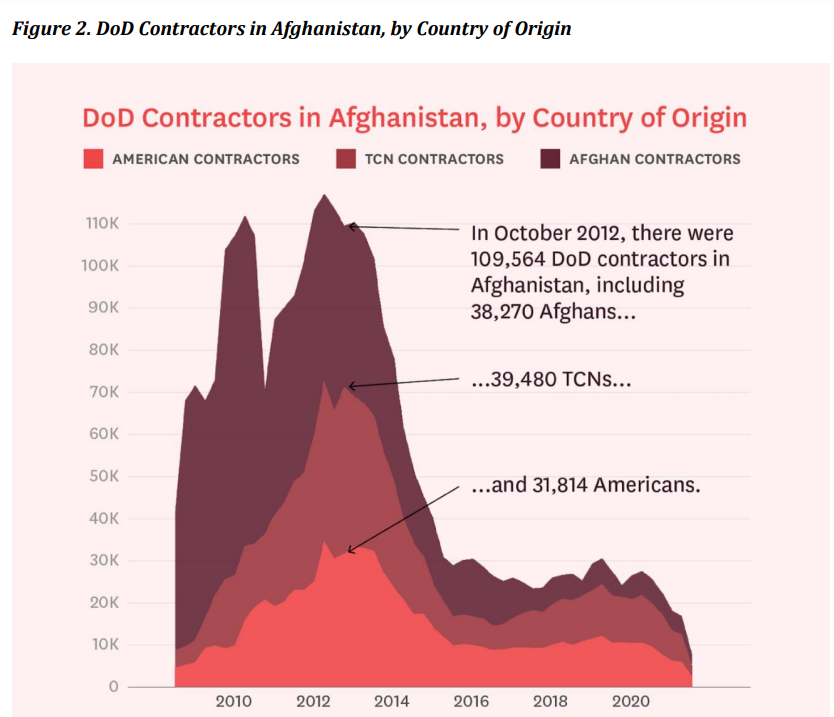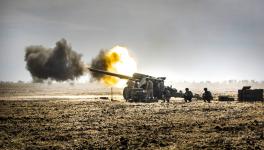Third-World Workers Injured, Killed at US Bases in Afghanistan Not Fully Compensated
Representational use only.Image Courtesy: picryl
The United States (US) most likely provided little or no compensation to several third-country nationals (TCNs) out of tens of thousands from Nepal, the Philippines and other developing countries who were killed or wounded during their employment at US military bases in Afghanistan.
According to a report authored by Noah Coburn and Peter Gill for the Costs of War Project at Brown University’s Watson Institute, US, around 4,000 contract workers, about 50% of them TCNs, died violently and thousands more sustained severe injuries during the war.

The report, released this week and shared exclusively with NBC News, states that TNCs represented more than a third of the 100,000-plus contract workers employed by the Pentagon at their peak in 2012.
TNCs were employed as cafeteria workers, janitors and often armed guards at the bases. During a car bomb explosion or other Taliban attack, Afghans and TCNs “were far more likely to be killed or injured”. “A US military veteran … told us that Americans sometimes referred to their Nepali colleagues as ‘flak jackets’ and ‘bait’ for suicide bombers,” Coburn and Gill write.
On the job, contracting companies also regularly put Nepalis and other TCNs at significant risk. At many US and NATO installations, the perimeter had several layers of protection with local police guarding the outermost ring, TCNs guarding the next ring and Americans (including soldiers and contractors) positioned only in the most internal posts, according to the report.
The US Central Command reports that, despite the withdrawal from Afghanistan, it still relies on more than 21,000 contractors in its area of responsibility, more than 9,000 of whom are third-country nationals. It is also an issue that goes far beyond Afghanistan and the Middle East. Reliance on TCNs is a key component of current US military operations around the world, the report states.
TCNs working on various US subcontracts were subject to a range of forms of exploitation, including having pay withheld and passports confiscated by their companies. Most TCNs were not in a strong bargaining position vis-à-vis their employers because of their financial vulnerability and the fact that they could be detained or imprisoned without the protection of the companies for whom they worked.
As per the Defense Base Act, Pentagon contractors must buy insurance for employees to compensate them for serious injuries or pay their families if they are killed. However, Coburn and Gill found during interviews with more than 200 workers that either they were inadequately compensated or not compensated at all, NBC reported.
The interviews revealed that 12 contract workers injured or killed appear not to have received proper compensation. “The US has depended on third-country nationals like Nepalese for their bases. They are cheaper. One of the few protections they have is the Defense Base Act for insurance and even that is not working,” Gill said.
“Our review of cases of Nepali workers in Afghanistan, however, finds that many TCNs do not even get to the stage where they can file an insurance claim. This occurs because they are unaware of their rights, their employers do not purchase the required insurance, and/or their employers do not support their victimised employees in filing claims.”
The pattern of these cases suggests that companies deliberately removed injured TCNs from Afghanistan to Nepal as quickly as possible and denied them paperwork concerning their injury and termination—although they often provided smaller cash payments. There is no logical rationale for these practices other than the companies’ hopes that this would deter victims from seeking outside legal assistance.
For example, Nepalese Goma Kunwar lost her husband Yam Bahadur, a security guard, in a suicide bombing attack at a US compound on the outskirts of Kabul in 2012. As per the Act, Kunwar was entitled to around $250,000 in insurance payout but received only $48,000. Kunwar has demanded a Labour Department special court for a fuller compensation.
According to the report, the US pays millions to contractors to pay the cost of worker insurance but the companies are not required to report whether they have bought such insurance with only a few opting for voluntary disclosure.
Coburn and Gill obtained the payout information via the Freedom of Information Act and found that TCNs received compensation less than half as often as their American counterparts.
As contracting expert David Isenberg points out, “If nobody reports the incident to the Department of Labour and the family does not file a claim, the US government has no way of knowing what happened.”
Shockingly, Pentagon contractors who violated the Defence Base Act were not punished despite some of them not telling injured TNCs that they could get compensated for severe injuries and not informing family members of dead workers about their right to compensation, the report showed.
At least, six times, according to Coburn and Gill, the Department of Labour found that American contractors didn’t file insurance claims for injured workers—but the penalty for the offences amounted to only $3,250. Four other companies lost their contracts for not having proper insurance.
“You just don’t have nefarious companies; you also have a government that allows these practices to continue,” Coburn said.
Some TCNs or their survivors have sought redress in US courts. The authors cite the work of Matthew Handley, a Washington attorney who has worked on around 50 cases of workers, mostly Nepalese, seeking fuller compensation.
“Foreign workers are short-changed most often. The laws that are supposed to compensate workers have overwhelmingly benefited Americans as opposed to third-country nationals,” Handley told NBC News.
While the Labour Department refused to comment on the report without seeing it, a Department of Defence spokesperson said, “The Department of Defence is not aware of the cited study nor any specific cases of Defense Base Act noncompliance. The rules are very clear when overseas workers’ compensation and war-hazard insurance is required.”
Get the latest reports & analysis with people's perspective on Protests, movements & deep analytical videos, discussions of the current affairs in your Telegram app. Subscribe to NewsClick's Telegram channel & get Real-Time updates on stories, as they get published on our website.
























